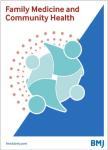Answering calls for rigorous health equity research:a cross-sectional study leveraging electronic health records for data disaggregation in Latinos
作者机构:Family MedicineOregon Health&Science UniversityPortlandOregonUSA Department of MedicineUniversity of MassachusettsBostonMassachusettsUSA College of Social Sciences and HumanitiesNortheastern UniversityBostonMassachusettsUSA Rutgers School of Public HealthPiscatawayNew JerseyUSA OCHINPortlandOregonUSA California University of Science and MedicineColtonCaliforniaUSA
出 版 物:《Family Medicine and Community Health》 (家庭医学与社区卫生(英文))
年 卷 期:2023年第11卷第2期
页 面:9-17页
基 金:This work was funded by the NIH National Institute for Minority Health and Health Disparities(grant number R01MD014120 awarded to JH) grant number K23MD015267 awarded to EB DMC was in part supported by the Robert Wood Johnson Foundation
摘 要:Introduction Country of birth/nativity information may be crucial to understanding health equity in Latino populations and is routinely called for in health services literature assessing cardiovascular disease and risk,but is not thought to co-occur with longitudinal,objective health information such as that found in electronic health records(EHRs).Methods We used a multistate network of community health centres to describe the extent to which country of birth is recorded in EHRs in Latinos,and to describe demographic features and cardiovascular risk profiles by country of *** compared geographical/demographic/clinical characteristics,from 2012 to 2020(9 years of data),of 914495 Latinos recorded as US-born,non-US-born and without a country of birth *** also described the state in which these data were *** Country of birth was collected for 127138 Latinos in 782 clinics in 22 *** with those with a country of birth recorded,Latinos without this record were more often uninsured and less often preferred *** covariate adjusted prevalence of heart disease and risk factors were similar between the three groups,when results were disaggregated to five specific Latin countries(Mexico,Guatemala,Dominican Republic,Cuba,El Salvador),significant variation was observed,especially in diabetes,hypertension and *** In a multistate network,thousands of non-US-born,US-born and patients without a country of birth recorded had differing demographic characteristics,but clinical variation was not observed until data was disaggregated into specific country of *** policies that enhance the safety of immigrant populations may enhance the collection of health equity related *** and effective health equity research using Latino country of birth information paired with longitudinal healthcare information found in EHRs might have significant potential for aiding clinical and public health practice,but it d



